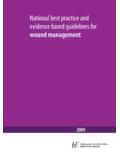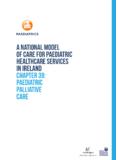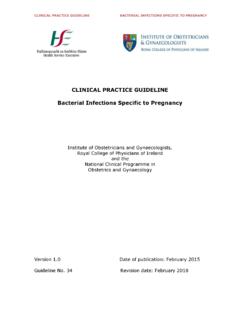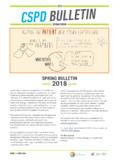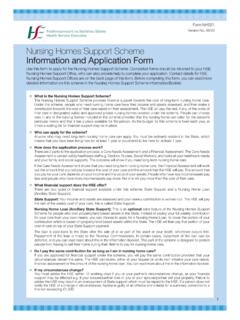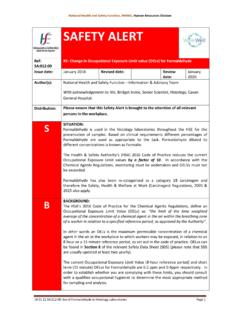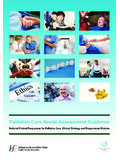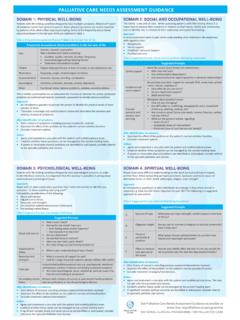Transcription of Caring for yourChild - Ireland's Health Service
1 Caring for yourChildSixMonthsto 2 YearsContents PageIntroduction 3 Taking care of yourself as a parent 4 Especially for Mams 4 Especially for Dads 5 For Mams and Dads 6 Getting extra support for parents 7 Caring for twins or more 9 Feeding your young child 10 Breastfeeding 10 Formula feeding 11 Starting to spoonfeed your child 12A healthy, balanced diet for your child 18 Common questions about food and children 19 Caring for your child s teeth 20 Sleeping and crying 24 Where should my child usually sleep? 24 How much sleep does my child need? 25 Reducing the risk of cot death 26 Why does my child cry? 28 Caring for your young child every day 30 Bathing your child 30 Dressing your child 30 Preparing to toilet train 30 Lifting and carrying your child 31 Immunisation 32 Common childhood illness 34 A guide to your child s growth and development 38 Posture and development 38 PageWeight gain and growth 41 Your child s eyes 42 Your child s hearing 43 Your child s speech and language development 44 Your child s social, emotional and behavioural development 46 Health checks for your child 53 Your child with special needs 54 Playing and learning 58 What is play?
2 58 Learning through the senses 60 Developing through play 61 Playing with toys 64 Keep your child safe 66 How to keep your child safe 66 How can I keep my child safe in the sun? 67 What should I do if my child has an accident? 68 How can I keep my child safe outside the home? 68 Travelling in the car with your child 68 Childcare arrangements 70 Babysitting arrangements 70 Your benefits & leave entitlements 72 Useful web pages & phone numbers 76 SixMonthsto 2 Years12345678910 Your Public Health Nurse: Your Health Centre:ForewordThis information pack is the second in a set of three packs for parents: Caring for Your Baby: Birth to Six Months Caring for Your Child: Six Months to Two Years Caring for Your Child: Two to Five Years Each one contains information to help you to care for yourself and your child during your child s first five years.
3 Before we produced this information pack, we asked parents what information they needed to care for themselves and their baby or toddler during this time. Parents said they wanted common-sense information and tips on the general care of their child; information about the growth and development of their child; advice about what to do if their child has a problem; and details of what people and services to get in touch with for more help and information in this pack is based on the most up-to-date, accurate information available within the Health Services, and on opinion from professionals in child Health , support services, voluntary organisations and parent baby is special and for some of you, the details in this pack are only the beginning of your search for information on how to do the best for your baby and you.
4 No booklet is a replacement for talking with someone who is trained to help you, so the useful web pages and phone numbers at the end of the pack will help you reach a wide range of trained thanks to all the Health professionals who helped in the development of this child Health information pack, especially the publishedOctober 2005 Reviewed2009 Updated2015 For copies, contact your Public Health Nurse or see Welcome to Caring for Your Child: Six Months to 2 years. This booklet contains valuable information to help you care for yourself and your child over the next year and a half. Caring for your young child is an exciting and challenging time for everyone involved. This information pack will help you deal with the everyday concerns of being a parent.
5 It will also point you to people and services that offer further information and hope you enjoy reading it and find it Caring for yourBaby2 to 5 Years Caring for yourChildIntroduction Taking care of yourself as a parentEspecially for MamsCaring for a small child is rewarding, but it can be very tiring too. Let your partner or a family member help with the day-to-day housework, if you can. Then you can focus on your child and yourself until a pattern forms in your daily routine that you are able to manage. If you do not have a family member to turn to, see page 7 for details of extra support. You may also feel that you have very little time for yourself since your child was born.
6 It is important to look after your own needs so that you are better able to look after the needs of your family. Here are some tips to help you unwind. Ask your partner or a family member to look after your child while you have a short rest Go for a walk or a swim Call in on a friend for a chat over coffee Treat yourself to little things such as a trip to the hairdresser if you can afford itEating wellIt can take your body up to nine months to recover fully after a pregnancy and delivery, especially if you had a caesarean section. To help you recover, follow a healthy eating plan and combine it with exercise. Look at the food pyramid to help you choose a balanced diet. Remember going on a weight loss diet is not recommended just after you have given birth especially, if you are our leaflet Your Guide to Healthy Eating using the Food Pyramid available in the publications section on Especially for DadsAs your child grows and develops, he or she will become more alert.
7 The most important thing you can give your growing child is your love. This includes spending time with your child and getting to know them by keeping actively involved in their routine. If you work outside the home, set aside some time when you come home. Play and read with your child, even though you may feel tired after a day s work. Remember that your partner is also tired after a long day Caring for your child or working, just like you. After you spend time withyour child, spend time with your partner to chat and relax. You also need to care for yourself. Arrange some free time for yourself to relax. For example, meet up with friends or go to the gym. Choose any 2 Choose any 5+Chooseany 6+Choose any 3 Maximum 1 Choose any 2 Top Shelf foods are high in fat, sugarand salt, are not essential for healthand taken in excess can be and oils are essential, but only in small foods and drinks on the bottom 4 shelves of the Food Pyramid are essential for good it is important to find the balance between your work needs, your family needs and your own needs.
8 As your child grows, a daily routine will emerge. Try to reduce the stress by preparing for it by making packed lunches, and preparing older children s sports bags ahead of time. Get up 10 minutes earlier to give your family some breathing space in the morning. Plan meals in advance. While it will not get any easier, you will get more used to the daily organising that is part of being a parent. Looking after yourself and your close relationshipsAs a parent, you aim to do the best for your child and your family. You learn to do this as you go along, taking the tips you learned from your own upbringing, from other people and from the supports around you. Remember that you are also a person as well as a parent.
9 You need to look after yourself so that you can look after others around you. Take care of yourself and your close relationships in the ways listed below. Be realistic as a parent. Try not to expect too much of yourself or of others around you, but don t take yourself or others for granted either Trust your instincts. You are doing a good job and learning new things every day in this important role Reward yourself regularly by relaxing and doing something that makes you feel good, like taking some time out to go for a walk or go to the pictures or go out for a meal with your partner or a friend If you make mistakes, then learn from the experience and move on. All parents make mistakes because nobody is perfect Although you may not always agree with your partner, never argue in front of your child.
10 Arguing upsets children. Discuss your feelings in private and work out a solution together If you find that it is hard to cope, then do not be afraid to ask for extra helpGetting extra support for parentsThere may be certain times as a parent when you need extra support to help your child and your family. You are not alone in looking for help. You will find that other parents need extra support at times too. Getting extra support is a smart thing to do it clearly shows that you value your family. There is a wide range of services available to help you and your family when you need it. Here are some examples of supports;Public Health nurses are there to help you and your family.
